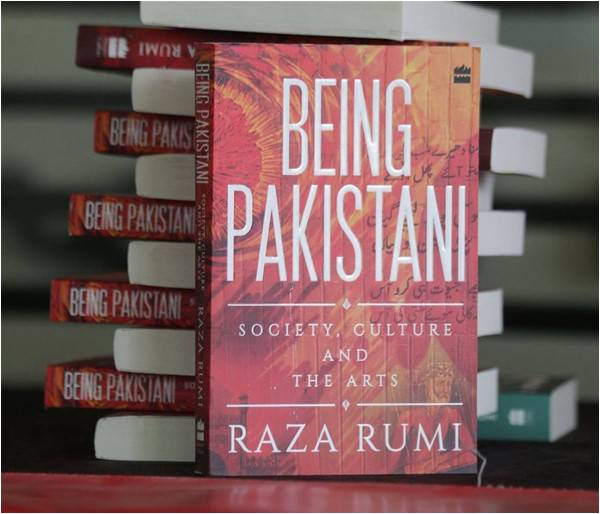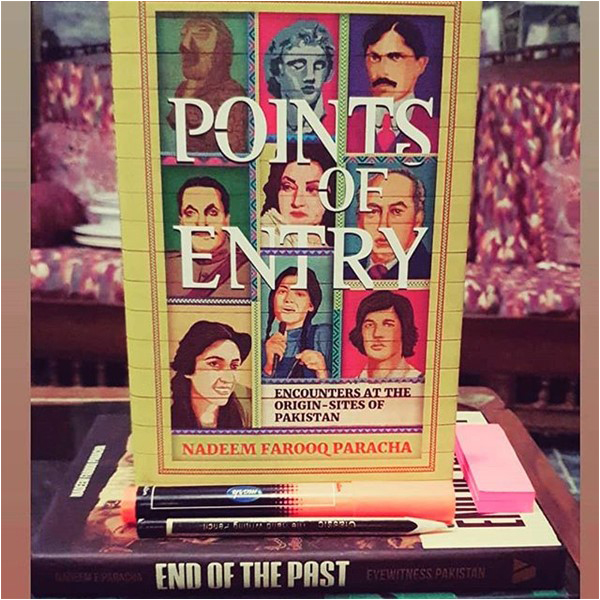
Questions about Pakistan’s identity remain unending, unsolved and are enduring. Intellectuals on both sides of the ideological spectrum, conservative and progressive, are constantly engaged in exploring this conundrum. The latter have their job cut out for them given the overwhelming state support for the former.
At the same time, modern progressive writers like Nadeem Farooq Paracha and Raza Rumi have consistently been coming up with original, informative and insightful works on the people of Pakistan, their history and culture. Their take on history or romanticism with the folk culture or local faith can be contested but their observations are sharp and their analysis robust. Both have once again come up with fresh and vibrant takes on the identity puzzle. Paracha’s Points of Entry; Encounters at the origin sites of Pakistan is a study of unexplored Pakistan, looking downstream from Karachi but adequately supported by academic literature. Raza Rumi’s Being Pakistani: Society, Culture and Arts is a collection of essays and lectures on the past and present of literature and arts as seen through the identity lens.

Both books are personal accounts with the running theme of intellectually excavating forgotten and buried cultures of the land that became Pakistan in 1947. The ancillary theme is challenging the ‘official’ and dominant narrative of nationhood and the ensuing culture imported largely from Arab culture and popularized by the religio-national narrative. An indigenous and cultural perspective of nationhood is presented as an alternative. It is thus no surprise that the river Indus appears prominently in both books, as not only an economic lifeline but also carrying with it a unique cultural tradition. The joint Hindu-Muslim saint Udero Lal thus figures as a symbol of the Indus saga in both books. The same saint figure has been variously known as Shaikh Tahir and Khawaja Khizr.
The Indus forms the foundation of civilization which predates almost everything - invaders, religions and even culture. Aitzaz Ahsan’s Indus Saga was of course the earliest popular book on the subject which has served as a model for latter day revisionist works on social and folk history.
Both Paracha and Rumi’s styles are unique to both authors. NFP’s crisp and sharp observations of the bohemian scene in Karachi are matched by Rumi’s mapping of the intellectual scene of post-independence Lahore. Both books contain some delightful and informative essays. NFP’s essay on the Sheedis of Lyari and their link with Zaire and the story of his ferry ride from Mianwali to Multan on the Indus are a visual treat. Forgotten communities like the Chinese in Pakistan and Goan Christians are enlivened in his stories. He is perhaps the only chronicler of pop music in Pakistan having the advantage of being acquainted with most leading musicians of our time. Rumi on the other hand chronicles artists and the literati. He has done great service to us philistines by making art relatable and readable and therefore politically relevant. His sketches of Quratulain Hyder and Mustafa Zaidi are thorough yet fresh. His critique on Hyder’s writings as a symbol of our civilisation instead of ideology, presents the writer in a hitherto unseen light.
This is an opportunity for the new English reading generation to appreciate fiction of global standing and for Urdu readers to move ahead and away from Raja Gidh.
The civilisation “project” however is an onerous task. One wonders, even if there were no state patronage, whether we could combat conservatism and obscurantism, which appear to be hallmarks of our era. The era which the historian Eric Hobsbawm calls the “Age of Extremes” has cast its dark shadow on states like Turkey and Egypt – which took on civilisation projects of their own, and even India and Thailand. Modi’s India is imploding in the name of culture and the perceived unity of the motherland with disastrous consequences.
On our side of the divide, there is a constant lament about the erosion of ‘folk religion’ or Sufism but the same Sufism has given birth to social extremism of an ominous proportions. Muhammad bin Qasim might be irrelevant to our history but so are Raja Dahir and Raja Poras. Iran’s Raza Shah Pehlavi was so fed up with his mollahs that he turned his calendar a few thousand years back and anointed himself Arya Mehr, but that couldn’t prevent Iran from plunging into obscurantism. The State might have been complicit in shaping the course of society but the same society did not accept Bullah Shah and Shah Hussain at the best of times. The chances of their acceptance now are even slimmer.
Revisionism is natural in crafting or discovering an alternative narrative but one must not lose sight of the fact that revisionism after all is a forte of conservatives. Tales of yore when spirituality was supposedly the order of the day, are long gone. It’s going to be hard to persuade a cynical populace on cherry-picked and feel-good stories of pluralism when they have an unlimited supply of state sponsored tales of lost glory. The future might thus be best served in looking forward than selectively looking back.
At the same time, modern progressive writers like Nadeem Farooq Paracha and Raza Rumi have consistently been coming up with original, informative and insightful works on the people of Pakistan, their history and culture. Their take on history or romanticism with the folk culture or local faith can be contested but their observations are sharp and their analysis robust. Both have once again come up with fresh and vibrant takes on the identity puzzle. Paracha’s Points of Entry; Encounters at the origin sites of Pakistan is a study of unexplored Pakistan, looking downstream from Karachi but adequately supported by academic literature. Raza Rumi’s Being Pakistani: Society, Culture and Arts is a collection of essays and lectures on the past and present of literature and arts as seen through the identity lens.

Both books are personal accounts with the running theme of intellectually excavating forgotten and buried cultures of the land that became Pakistan in 1947. The ancillary theme is challenging the ‘official’ and dominant narrative of nationhood and the ensuing culture imported largely from Arab culture and popularized by the religio-national narrative. An indigenous and cultural perspective of nationhood is presented as an alternative. It is thus no surprise that the river Indus appears prominently in both books, as not only an economic lifeline but also carrying with it a unique cultural tradition. The joint Hindu-Muslim saint Udero Lal thus figures as a symbol of the Indus saga in both books. The same saint figure has been variously known as Shaikh Tahir and Khawaja Khizr.
The Indus forms the foundation of civilization which predates almost everything - invaders, religions and even culture. Aitzaz Ahsan’s Indus Saga was of course the earliest popular book on the subject which has served as a model for latter day revisionist works on social and folk history.
Both Paracha and Rumi’s styles are unique to both authors. NFP’s crisp and sharp observations of the bohemian scene in Karachi are matched by Rumi’s mapping of the intellectual scene of post-independence Lahore. Both books contain some delightful and informative essays. NFP’s essay on the Sheedis of Lyari and their link with Zaire and the story of his ferry ride from Mianwali to Multan on the Indus are a visual treat. Forgotten communities like the Chinese in Pakistan and Goan Christians are enlivened in his stories. He is perhaps the only chronicler of pop music in Pakistan having the advantage of being acquainted with most leading musicians of our time. Rumi on the other hand chronicles artists and the literati. He has done great service to us philistines by making art relatable and readable and therefore politically relevant. His sketches of Quratulain Hyder and Mustafa Zaidi are thorough yet fresh. His critique on Hyder’s writings as a symbol of our civilisation instead of ideology, presents the writer in a hitherto unseen light.
This is an opportunity for the new English reading generation to appreciate fiction of global standing and for Urdu readers to move ahead and away from Raja Gidh.
The civilisation “project” however is an onerous task. One wonders, even if there were no state patronage, whether we could combat conservatism and obscurantism, which appear to be hallmarks of our era. The era which the historian Eric Hobsbawm calls the “Age of Extremes” has cast its dark shadow on states like Turkey and Egypt – which took on civilisation projects of their own, and even India and Thailand. Modi’s India is imploding in the name of culture and the perceived unity of the motherland with disastrous consequences.
On our side of the divide, there is a constant lament about the erosion of ‘folk religion’ or Sufism but the same Sufism has given birth to social extremism of an ominous proportions. Muhammad bin Qasim might be irrelevant to our history but so are Raja Dahir and Raja Poras. Iran’s Raza Shah Pehlavi was so fed up with his mollahs that he turned his calendar a few thousand years back and anointed himself Arya Mehr, but that couldn’t prevent Iran from plunging into obscurantism. The State might have been complicit in shaping the course of society but the same society did not accept Bullah Shah and Shah Hussain at the best of times. The chances of their acceptance now are even slimmer.
Revisionism is natural in crafting or discovering an alternative narrative but one must not lose sight of the fact that revisionism after all is a forte of conservatives. Tales of yore when spirituality was supposedly the order of the day, are long gone. It’s going to be hard to persuade a cynical populace on cherry-picked and feel-good stories of pluralism when they have an unlimited supply of state sponsored tales of lost glory. The future might thus be best served in looking forward than selectively looking back.

